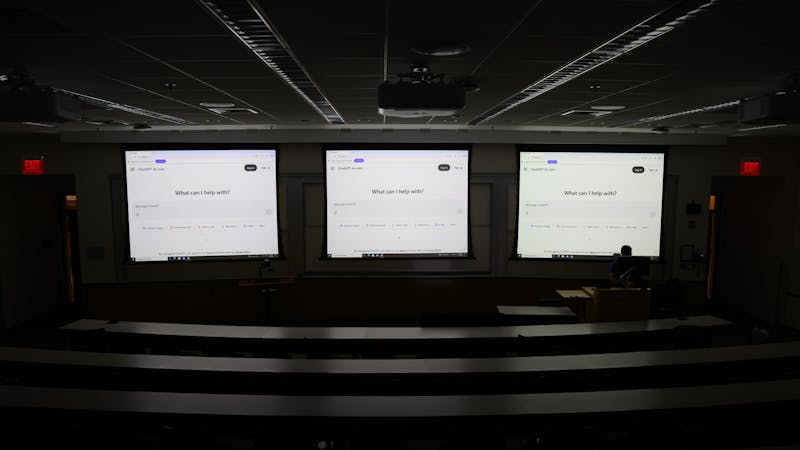“Every single person that I have worked with in the past ten years in this field who is not at the World Bank is either furloughed or terminated,” says Penn professor Heather Huntington.
As associate director of Penn’s PDRI–Devlab, Huntington leads an initiative dedicated to applied social science research, including climate–oriented projects that benefit foreign countries. The lab’s work spans conflict and security, governance, economic development, migration, and global health, providing a foundation for policy development that serves vulnerable populations. Bringing together faculty and graduate students from seven schools across Penn, researchers collaborate with government agencies and private companies to design and evaluate impactful research projects. With a focus on the human consequences of policies—such as in the case of deportation and forced displacement—the Devlab carries out important projects in gauging the success of initiatives globally. Its very existence is being called into question by Donald Trump’s (W ‘68) wide–ranging slashing of research initiatives.
The carnage resulting in the layoffs described by Huntington began on Jan. 24, when Elon Musk’s (C, W ‘97) Department of Government Efficiency issued stop–work orders to multiple departments, including the United States Agency of International Development, in order to review grants. Departments were notified of contract terminations shortly after and mass layoffs ensued, nearly decimating the United States Agency for International Development despite questions of constitutionality.
The loss of federal jobs is only the tip of the iceberg. Government grants first flow to private–sector companies, which then, in turn, subcontract work to research labs at universities. Universities will be and have been affected, as seen at Penn’s Devlab, but the impacts extend far beyond academia. DOGE is directly or indirectly responsible for over 170,000 layoffs across industries, all linked to these cuts in various contracts.
DOGE is not only withdrawing grant funding, but it is also dismantling the very mechanisms and institutional structures that allocate grant funding. DOGE claims to be getting rid of specific projects that it deems wasteful, but in reality, these policies are indiscriminately debilitating research across the board. For example, the Department of Defense’s Minerva Grant Initiative was slashed wholesale. While research assistant professor at Devlab Jeremy Springman will no longer receive money from this initiative for his climate change research, his colleagues who conduct research in other areas of social science unrelated to sustainability, such as national security, were also affected.
The world of climate research transcends researchers in labs at universities: Both large and small businesses in the private sector, as well as international communities relying on research for sustainable agriculture and land use policy, have all felt the impacts of these cuts. According to Springman, decadelong projects have now been completely scrapped with little hope of revival. Springman, whose own position depends on his ability to bring in grants, fears his position will be terminated. Huntington adds that some positions have already been terminated, prospective employees have had their acceptances rescinded, and the lab is undergoing a period of downsizing that will last around six months.
As the private sector, universities, and the government negotiate the fickle whims of an elite few, the climate continues to deteriorate. Last year was the hottest year on record, with temperatures reaching 1.5 degrees Celsius above preindustrial levels—the threshold and maximum target limit set by the Paris Climate Agreement in 2015. This is not just some arbitrary number; rather, it represents life and death stakes for humans and animal species. At this precipice, news of massive cuts at the Environmental Protection Agency rings alarm bells for scientists and engaged citizens alike, constituting a decisive step in the wrong direction.
Penn’s Devlab is one of the many moving parts thrown into turmoil by Trump and Musk’s disruptions, which are creating huge consequences for not only research, but also a whole ecosystem of policy implementation, project evaluation, and international aid.
Professor Irina Marinov in the Department of Earth and Environmental Science has been collaborating with Springman and Presidential Penn Compact Professor of Political Science Erik Wibbels on a project to leverage large data sets to evaluate global climate security. Springman had been compiling data from news outlets in developing countries for a long time to analyze links between political instability and climate risks. The collaboration with Marinov and Wibbels draws from a few hundred data sets to provide information on global climate. Their idea was to eventually create an open–source platform that draws together climate risks and socioeconomic factors to produce a starting point to take informed climate action. The project would also bring together natural scientists and social scientists in useful and productive ways.
Now, due to lack of funding, the project has been shelved indefinitely. “USAID really invested in this, allowing us to build this research infrastructure that allowed us to do a whole bunch of different types of work with one set of staff and one apparatus, that now just goes away overnight,” Springman says. The staff working on this project had been working on specific tasks for five to six years, and they cannot be replaced easily, even if funding were to be reinstated.
Huntington has also faced similar setbacks. Previously, she had been working with countries like Burkina Faso, Mozambique, and Uganda, mainly focusing on issues like land rights, disputes over land, and conflict resolution, but all of her ongoing projects in sustainable agriculture and conservation in Africa are now canceled. This situation is not unique to her; the majority of ongoing projects at the Devlab have been scrapped.
The impact of the abrupt end of research projects is hard to gauge. Beyond a projected loss of jobs at the Devlab, projects that evaluate the success of environmental initiatives around the world will now cease yielding results. This means, among other things, that scientists and policymakers could be in the dark about the effectiveness of health, economic, security, climate, and migration policies in countries around the globe.
Research is not the only part of climate science at Penn that will be affected—the trickle–down effects of funding cuts will reach all aspects of the EESC department. The ability for the department to effectively teach is greatly impacted. Marinov explains that Penn’s EESC department, compared to those of other top universities, is small and has far fewer faculty. Now, there will be a halt on planned growth, which will inhibit the ability of the department to teach new classes, as there will be no new professors to develop them.
As a small department, EESC also lacks in–house labs, relying on free access to data from institutions such as the National Center for Atmospheric Research or the Geophysical Fluid Dynamics Laboratory at Princeton University which receive funding from the National Oceanic and Atmospheric Administration. In her course “Climate and Big Data,” Marinov connects 30 students to both NCAR and GFDL models. Beyond the classroom, researchers from all areas use this integral data for modeling and projects. However, even these well funded labs are on the chopping block for DOGE, with a host of GFDL employees having been fired two weeks ago.
Marinov is worried about the possibility of some of these labs closing or their output being affected. For example, the NOAA office in Hawaii, which manages the Mauna Loa Observatory, a famous site that has been collecting data since 1958, might lose its lease. “The disappearance of data sets or stopping the collection of data sets of climate and stopping the production of climate model runs will affect not just the U.S., but the entire science community, especially scientists in smaller universities that cannot produce their own data sets or the developing world,” she says. “It’s going to destabilize science at a larger scale.”
Since DOGE began its rampage, the status of climate research and foreign aid projects has become tenuous. “We really don’t know what’s going to be cut and when and why,” Marinov says. Amid concerns about the status of ongoing environmental research, professors are anxious about the University’s reaction to mounting government pressure.
In an email from March 17 obtained by Street, Interim Dean of the School of Arts and Sciences Jeffery Kallberg and Vice Dean for Finance and Administration Corinn Harrel state that the University will remain proactive in its response to impending government policies. The correspondence emphasized a freeze on hiring staff past March 10, a forewarning of “extremely limited” future faculty searches, and the cessation of SAS–based research grant programs. Another email obtained by Street from Feb. 23 announced that SAS would be limiting the acceptance of prospective Ph.D. students by “one third,” reiterating that “this is not a step any of us wanted to take.”
While the University has continued to issue resolute responses to imminent funding cuts, Marinov believes that Penn could be more transparent about the motivations underlying its financial decisions and their potential impact on professors and faculty researchers. “Why are certain cuts imposed? How healthy are the University budgets?” Marinov asks.
Broader dissatisfaction with Penn’s response to funding cuts culminated in a rally on March 20 composed of graduate workers, Penn faculty members, and nonprofit membership associations, including the American Association of University Professors. Protesters demanded that Penn “uphold research, sanctuary DEIA, nondiscrimination, and the rights of all members of our community.” According to Pennsylvania state Rep. Rick Krajewski, who was in attendance, the demands included drawing from the University’s $22.3 billion endowment as a measure to “counteract federal funding freezes.”
Despite criticism expressing concern for the fate of climate studies and environmental research at Penn, Vice Provost for Climate Science, Policy, and Action Michael Mann maintains that “We remain undeterred in our work involving teaching, research, outreach, and stewardship in the area of climate and sustainability.”
Although Penn has expressed an unyielding commitment to protecting climate studies and subsequent research, uncertainty persists over the broader future of sustainability studies in higher education. Julian Dautremont, director of programs at the Association for the Advancement of Sustainability in Higher Education describes how universities across the country are burdened with mounting financial pressures and administrative shifts, pushing them to implement cutbacks in sustainability projects:
“There hasn’t been a universal response from institutions,” Dautremont says, explaining how sustainability offices in higher education find themselves forced to prioritize projects with clear financial benefits, such as decarbonization, while deemphasizing broader sustainability goals.
Comparing the plight of climate change studies to universities’ erasure of diversity, equity, and inclusion initiatives, he notes that many offices engaged in University–wide efforts to “scrub” their websites of controversial language to avoid federal scrutiny of their work. Similarly, research and funding tied to climate change and clean energy is being restricted or delayed, with many institutions unsure of what will happen next. “A lot of institutions are either actually facing financial challenges or potential financial challenges,” Dautremont says. “That is increasing the emphasis on cost savings.”
The ripple effect of these changes extends beyond individual funding. While many universities have had to lay off significant portions of their sustainability staff, other universities are struggling to determine how new federal policies will impact their climate–focused research. This uncertainty has induced what Dautremont calls “anticipatory actions,” where institutions are forced to make strategic adjustments to brace for potential funding losses in the future. Similarly, investment initiatives tied to the Inflation Reduction Act, which once promised to accelerate clean–energy projects on campuses, are now stuck in limbo due to the rapidly shifting political landscape. “Higher ed is, in a sense, under attack,” Dautremont says. “American leadership in science and technology, including sustainability–related work, is very much in question.”
Despite monetary setbacks, sustainability in higher education remains a valuable part of universities’ curriculum. Many institutions are working to find ways to prioritize projects with strong financial returns, and student interest in sustainability does not appear to be wavering.
Amidst ongoing uncertainty, many universities are turning to collaboration and internal support networks rather than external policy advocacy. AASHE has been facilitating discussions among sustainability professionals to help universities share strategies and resources. However, Dautremont admits that the climate of unpredictability in today’s political landscape has made it difficult for organizations such as AASHE to provide concrete guidance.
For institutions such as Penn, where climate researchers have already begun reporting funding cuts and project cancellations in growing numbers, the stakes of Trump’s policies are markedly high. “It’s tragic,” Dautremont says. “This is the time that we need that kind of research to help, because it’s not like climate change is slowing down.”
As federal leadership on climate issues becomes increasingly unstable, experts warn of dire consequences not only for higher education but also for global climate cooperation. Michael Weisberg, Deputy Director of Perry World House, points out that the trust deficit between the United States and developing countries—already strained in international forums such as the United Nations and the Group of 20—will only be further exacerbated under Trump’s presidency.
“The current administration’s policy changes will make this worse,” Weisberg says. “And I’m not sure how that trust can be recovered. It’s a very long–term project.”
This erosion of international credibility, Weisberg notes, could fundamentally reshape how and where climate action takes place. Just as in Trump’s first administration, he predicts that much of the momentum for climate progress will shift away from national governments and toward cities, states, and other sub–national actors. “Nation–to–nation climate cooperation will be challenging,” he says. As climate change efforts are increasingly undermined by federal officials, universities and local governments may emerge as key players in preserving sustainability efforts and climate solutions.
Weisberg emphasizes that universities have and will continue to play a crucial role in climate research, technology development, and policy reform. However, with federal funding at risk and institutional budgets tightening, even vital research projects and international collaborations are faced with an unprecedented threat. The future of climate studies in higher education is balancing on an uneasy precipice—driven by long–term global consequences and immediate financial pressures.
The Devlab is a unique nexus point between science, the government, companies, and the global community. During this period of uncertainty, researchers emphasize the importance of having robust relationships between scientists and their community. “In these times, it seems silly to just be doing the science. The question becomes: ‘How can we communicate faster?’ And this is something that a lot of us were not trained in,” Marinov says. “It was not part of my Ph.D. to think about climate communication.”
In practice, the different schools at Penn function like silos, despite having related interests and worries about the climate. Collaborations across departments and schools in the communication of results to broader audiences are needed to curb the war on climate science and to create a community more resilient to government cuts. Compounding the issue is a lack of proactive compliance and transparency. Penn has an important decision to make: It can either be swept into the deluge or take a stand for our future.
As Huntington warns, the consequences of these cuts extend far beyond their intended target. “[The funding cuts are] a U.S. tragedy story, as well as a tragedy for the research side and for all the people who live in these countries who were depending [on them].”





